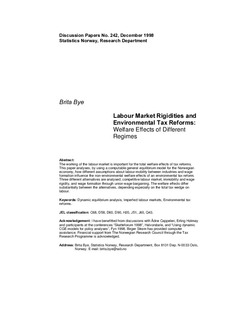| dc.contributor.author | Bye, Brita | |
| dc.date.accessioned | 2012-02-05T17:41:14Z | |
| dc.date.available | 2012-02-05T17:41:14Z | |
| dc.date.issued | 1998 | |
| dc.identifier.issn | 1892-753x | |
| dc.identifier.uri | http://hdl.handle.net/11250/180735 | |
| dc.description.abstract | The working of the labour market is important for the total welfare effects of tax reforms. This paper analyses, by using a computable general equilibrium model for the Norwegian economy, how different assumptions about labour mobility between industries and wage formation influence the non-environmental welfare effects of an environmental tax reform. Three different alternatives are analysed; competitive labour market, immobility and wage rigidity, and wage formation through union wage bargaining. The welfare effects differ substantially between the alternatives, depending especially on the total tax wedge on labour.
Keywords: Dynamic equilibrium analysis, Imperfect labour markets, Environmental tax reforms | no_NO |
| dc.language.iso | eng | no_NO |
| dc.publisher | Statistics Norway, Research Department | no_NO |
| dc.relation.ispartofseries | Discussion Papers;No. 242 | |
| dc.subject | Labour market | no_NO |
| dc.subject | Environmental taxes | no_NO |
| dc.subject | Welfare effects | no_NO |
| dc.subject | Dynamic equilibrium analysis | no_NO |
| dc.subject | JEL classification: C68 | no_NO |
| dc.subject | JEL classification: D58 | no_NO |
| dc.subject | JEL classification: D60 | no_NO |
| dc.subject | JEL classification: D90 | no_NO |
| dc.subject | JEL classification: H20 | no_NO |
| dc.subject | JEL classification: J51 | no_NO |
| dc.subject | JEL classification: J60 | no_NO |
| dc.subject | JEL classification: Q43 | no_NO |
| dc.title | Labour market rigidities and environmental tax reforms : welfare effects of different regimes | no_NO |
| dc.type | Working paper | no_NO |
| dc.subject.nsi | VDP::Social science: 200::Economics: 210::Economics: 212 | no_NO |
| dc.source.pagenumber | 33 s. | no_NO |
